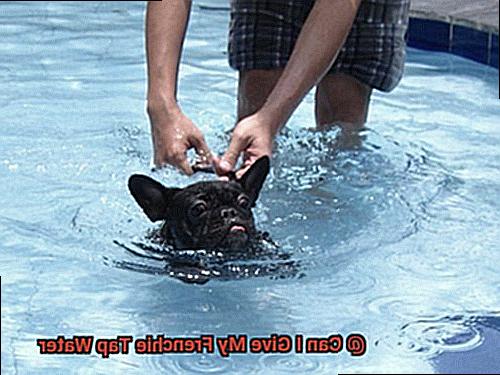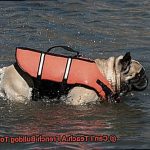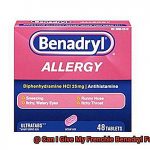Can I Give My Frenchie Tap Water?
Title: Can I Give My Frenchie Tap Water? Let’s Find Out.
Introduction:
Contents
- 1 Can I give my Frenchie tap water
- 2 Understanding the Quality of Tap Water
- 3 Chlorine in Tap Water and its Effects on Dogs
- 4 Heavy Metals in Tap Water and its Effects on Dogs
- 5 Bacteria in Tap Water and its Effects on Dogs
- 6 Minerals and Additives in Tap Water
- 7 The Best Sources for Frenchies’ Drinking Water
- 8 Tips for Improving the Quality of Tap Water
- 9 Consult Your Vet About Tap Water Safety
- 10 Conclusion
Hey there, fellow French Bulldog enthusiasts. We all know that our furry friends deserve the absolute best, and that includes what they drink. But have you ever wondered if tap water is safe for your beloved Frenchie? Well, you’re in the right place because we’re about to spill the tea (or should I say water?) on this topic.
When it comes to H2O, quality and safety are top priorities. While tap water is usually fine for us humans, we need to consider whether it’s suitable for our four-legged pals. In this blog post, we’ll dig deep into the question of whether tap water is a good choice for French Bulldogs. We’ll uncover any potential risks and benefits so that you can make an informed decision about what goes into your pup’s bowl.
So grab a glass of water (tap or not) and join us on this hydration exploration. Together, let’s make sure our adorable Frenchies stay happy, healthy, and hydrated.
Can I give my Frenchie tap water
As a French Bulldog owner, you want to ensure that your furry friend stays healthy and hydrated. One question that often arises is whether it’s safe to give them tap water. While tap water is generally safe for dogs, including French Bulldogs, there are a few factors to consider before filling their bowl.
In this article, we’ll delve into the various factors you should keep in mind to make an informed decision about giving tap water to your Frenchie.
Water Quality:
The quality of tap water can vary depending on where you live. Some areas may have higher levels of contaminants or additives in the water, such as chlorine or fluoride. It’s crucial to know the quality of your tap water and whether it meets recommended drinking water standards. Consider having your tap water tested for heavy metal contamination or bacterial presence if you have concerns.
Chlorine and Other Additives:
Chlorine is commonly used to disinfect tap water, but excessive amounts can be harmful to dogs. Before giving tap water to your Frenchie, let it sit for a few minutes to allow the chlorine to evaporate. Additionally, some municipalities add fluoride or other chemicals to tap water, which may not be ideal for your Frenchie’s health.
Temperature Matters:
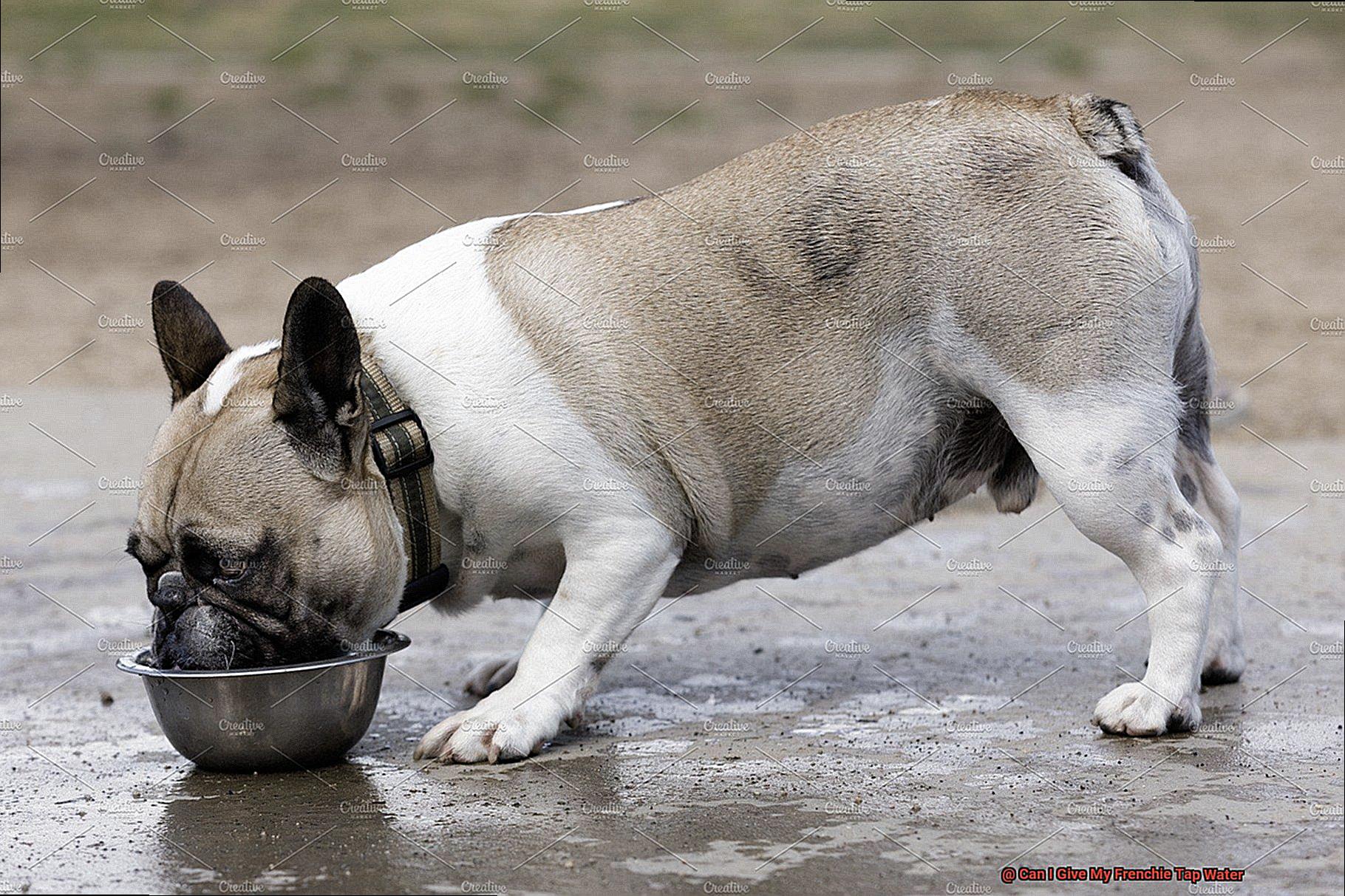
French Bulldogs are susceptible to heat sensitivity and can easily overheat. It’s essential to provide them with cool, fresh water, especially during hot weather or after physical activity. Ensure that the tap water you offer is at a suitable temperature to keep your Frenchie hydrated and comfortable.
Health Conditions:
If your Frenchie has specific health conditions like kidney problems or urinary tract issues, consult with your veterinarian about the best type of water for them. In some cases, filtered or bottled water may be recommended to minimize any potential aggravation of their condition.
Picky Drinkers:
Some French Bulldogs can be picky about their drinking water. If your Frenchie refuses to drink tap water, try offering them filtered or bottled water to see if they prefer it.
Ensuring that they stay properly hydrated is crucial, so finding a water source they enjoy is essential.
Understanding the Quality of Tap Water
Your French Bulldog is not just a pet; they are a beloved member of your family. As a responsible pet owner, it’s crucial to provide them with the best care possible. One often overlooked aspect of their health is the quality of tap water they consume. In this blog post, we will explore the importance of understanding the quality of tap water and its potential impact on your Frenchie’s health.
The Variability of Tap Water Quality
Tap water quality can vary significantly depending on the region and source. While municipal water systems treat tap water to remove contaminants, there can still be potential issues. Heavy metals like lead and copper, as well as chemicals such as chlorine, fluoride, and pesticides, can be present in tap water. These substances can have adverse effects on your Frenchie’s health if consumed in large quantities or over an extended period.
French Bulldogs and Sensitivity to Water Contaminants
French Bulldogs, like many other breeds, can have sensitive digestive systems. This sensitivity makes them more susceptible to the potential harmful effects of tap water contaminants. Additionally, Frenchies are prone to certain health conditions, such as skin allergies and gastrointestinal problems. Poor water quality can exacerbate these conditions and potentially lead to additional health issues.
Taking Proactive Measures: Water Filtration Systems
As a responsible pet owner, it’s essential to take proactive measures to ensure your Frenchie’s drinking water is safe and free from harmful contaminants. Investing in a quality water filtration system designed specifically for removing impurities from tap water can provide peace of mind and help safeguard your Frenchie’s health. These filtration systems effectively remove heavy metals, chemicals, bacteria, and viruses from tap water.
Considering Bottled Water Alternatives
Another option to consider is using bottled water as an alternative to tap water. However, it’s crucial to choose a reputable brand that undergoes rigorous testing and meets safety standards. Keep in mind that using bottled water can be costly and environmentally unfriendly.
Chlorine in Tap Water and its Effects on Dogs
We all know that our furry friends are part of the family, and we want to do everything we can to keep them happy and healthy. One way we can do that is by being aware of the potential effects of chlorine in tap water on our French Bulldogs. So, grab a cup of coffee (or tea, or whatever tickles your fancy) and let’s dive into this topic together.
The Scoop on Chlorine
Chlorine is commonly used in tap water as a disinfectant to keep bacteria and other harmful organisms at bay. While it’s generally safe for humans, our French Bulldogs might be a tad more sensitive due to their smaller size and unique physiology. They can ingest chlorine through drinking tap water, licking their fur after a dip in a chlorinated pool, or even inhaling chlorine vapors during shower time.
The Effects on Frenchie Tummies
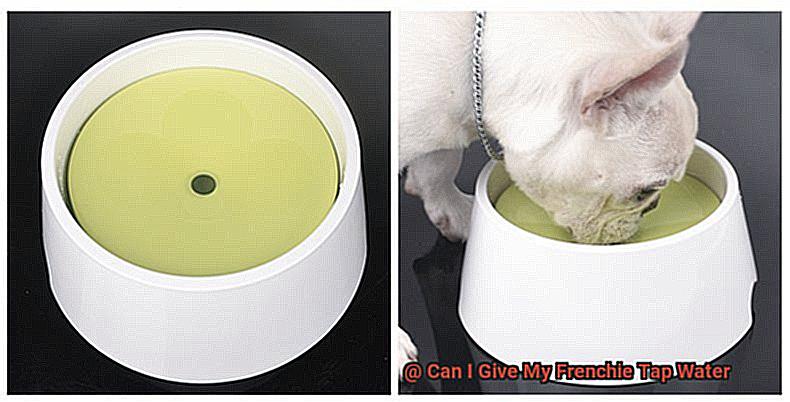
Short-term exposure to high levels of chlorine can give your Frenchie an upset tummy, resulting in some unwanted vomit sessions or bouts of diarrhea. Nobody wants that. Prolonged exposure to chlorine may also lead to more serious issues like dry skin, itchiness, and irritation. Some Frenchies may even develop respiratory problems or allergies due to chlorine exposure.
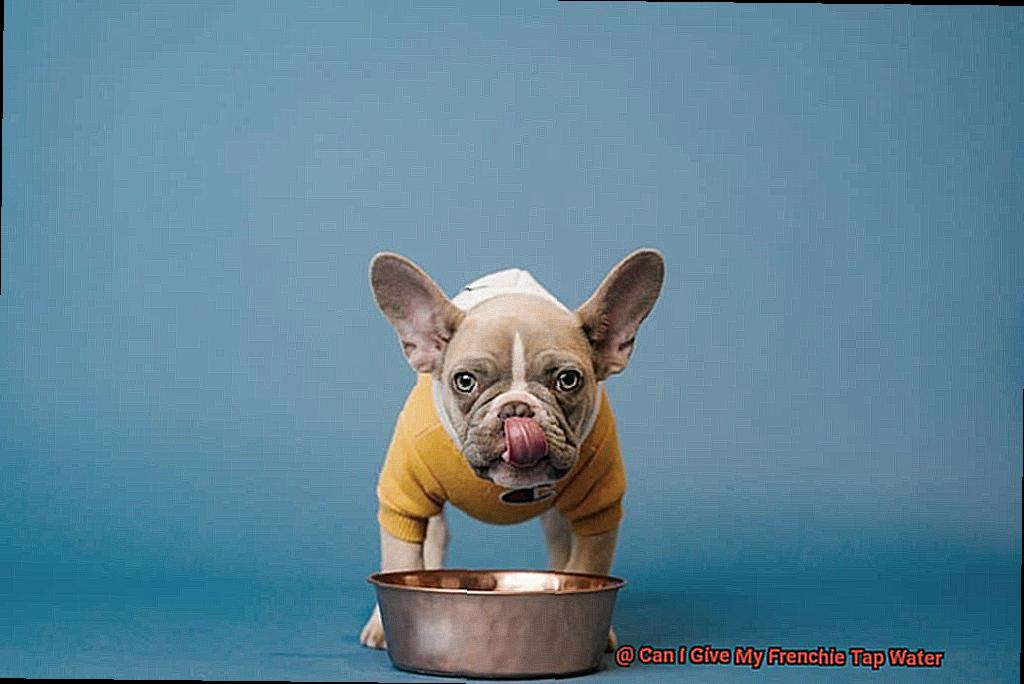
Not All Frenchies are Created Equal
It’s important to remember that not all French Bulldogs will react the same way to chlorine. Just like us humans, they have their own unique quirks and sensitivities. So, while one Frenchie might tolerate tap water just fine, another might need some extra TLC.
What Can You Do?
To minimize the potential effects of chlorine on your beloved Frenchie, consider using filtered or bottled water for drinking and bathing purposes. This can help reduce their exposure to chlorine and any potential irritants in tap water. Additionally, rinsing your Frenchie thoroughly after swimming in chlorinated pools and using a mild, hypoallergenic shampoo during baths can help soothe their delicate skin.
When in Doubt, Consult the Vet
Remember, if you notice any unusual symptoms in your Frenchie after exposure to tap water or chlorinated environments, it’s always best to consult with your veterinarian. They can provide proper diagnosis and treatment tailored specifically for your furry friend.
Heavy Metals in Tap Water and its Effects on Dogs
As responsible pet owners, we do everything we can to keep our furry friends healthy and happy. However, there may be hidden dangers lurking in our tap water that could be harming our beloved French Bulldogs. Heavy metals, such as lead, mercury, cadmium, and arsenic, can often be found in tap water due to various sources of contamination, including industrial waste and old plumbing systems. In this article, we will explore the potential effects of heavy metals in tap water on a dog’s health and discuss measures that can be taken to protect their well-being.
The Vulnerability of Dogs
Dogs are particularly vulnerable to the harmful effects of heavy metals due to their smaller size and lower tolerance levels. Their bodies cannot process these toxins as efficiently as humans can, making them more susceptible to health issues caused by heavy metal exposure.
Health Issues Caused by Heavy Metals
The ingestion of heavy metals through tap water can lead to a range of health issues in dogs. Lead, one of the most common heavy metals found in tap water, can have severe consequences on a dog’s health. It affects their nervous system, leading to behavioral changes, seizures, and developmental delays.
Mercury exposure through tap water consumption can result in kidney damage, tremors, and gastrointestinal issues in dogs. Cadmium is another heavy metal that can be present in tap water and can cause kidney damage, bone disorders, and respiratory problems.
Arsenic, often found in groundwater sources, can have detrimental effects on a dog’s health. It can lead to gastrointestinal issues, skin problems, and an increased risk of certain types of cancer.
Long-Term Accumulation
Regular consumption of tap water contaminated with heavy metals can accumulate these toxins in a dog’s body over time, leading to chronic health problems. Therefore, it is crucial for dog owners to be aware of the potential presence of heavy metals in tap water and take necessary precautions to protect their pets’ health.
Protecting Your Dog’s Health
To ensure the safety of your French Bulldog, it is recommended to test the tap water for heavy metal contamination. This will help you determine if additional measures need to be taken to protect your dog’s health.
If heavy metals are detected in the tap water, using alternative sources such as filtered or bottled water may be necessary to prevent health risks for dogs. Providing fresh and clean water for dogs at all times is crucial to their overall well-being and should be prioritized by pet owners.
Bacteria in Tap Water and its Effects on Dogs
These adorable little pups steal our hearts with their smushy faces and playful personalities. But did you know that your tap water could be posing a potential risk to your furry friend? That’s right, bacteria in tap water can have some not-so-fun effects on French Bulldogs. But fear not. We’ve got the lowdown on the risks and how to keep your Frenchie safe.
The Nasty Truth: Bacteria in Tap Water
Tap water can contain bacteria, and not the good kind either. We’re talking about E. coli, Salmonella, and Campylobacter – the stuff that can make both humans and dogs sick. While dogs have a higher tolerance for some bacteria, there are still risks involved. If your Frenchie gulps down contaminated tap water, they may experience diarrhea, vomiting, tummy troubles, and dehydration. No fun for anyone involved.
Doggie Defense: Reducing the Risk
Now that you know the risks, it’s time to take action. Here are some precautions you can take to keep those bacteria at bay:
- Get a Water Filtration System: Investing in a water filtration system is a paw-some way to ensure cleaner water for both you and your Frenchie. These systems can remove or reduce bacteria, chemicals, and other contaminants. Cheers to healthier hydration.
- Clean Water Bowls Regularly: Let’s face it – dogs aren’t always the cleanest drinkers. Stagnant water in their bowls can become a breeding ground for bacteria. So make sure to clean and disinfect their water bowls regularly to prevent any unwanted guests.
- Watch for Symptoms: Keep an eye on your Frenchie for any signs of illness after they’ve had a drink. If they’re acting out of sorts or showing symptoms like diarrhea or vomiting, it’s time to consult with your veterinarian. They can give you the guidance and support you need.
- Stay Informed: Knowledge is power, my friends. Stay up-to-date on the quality of your tap water. Check with your local water authority for any reports or concerns about bacterial contamination.
Minerals and Additives in Tap Water
As a French Bulldog owner, you want nothing but the best for your furry friend. One often overlooked aspect of their health is the water they consume. Tap water can contain minerals and additives that may have an impact on your dog’s well-being. In this article, we will explore the common minerals and additives found in tap water and their potential effects on French Bulldogs.
Minerals in Tap Water:
- Calcium: Essential for bone health and muscle function, calcium is an important mineral for French Bulldogs. However, excessive intake of calcium can lead to urinary tract problems or bladder stone formation. It’s important to ensure your Frenchie has a balanced diet to avoid an excess of calcium.
- Magnesium: This mineral plays a vital role in nerve function, muscle contraction, and maintaining healthy bones. While magnesium is beneficial in moderate amounts, excessive intake can cause diarrhea or gastrointestinal upset. Consult with your veterinarian about the appropriate levels of magnesium for your Frenchie’s specific needs.
- Potassium: Important for proper heart and muscle function, potassium is another essential mineral for French Bulldogs. Adequate potassium levels help maintain healthy blood pressure and nerve function. However, too much or too little potassium can be harmful, so it’s crucial to maintain a balanced diet.
Additives in Tap Water:
- Chlorine: Used to disinfect tap water, chlorine is necessary for eliminating harmful bacteria. However, some dogs may be sensitive to its taste and odor, leading to decreased water consumption and potential dehydration. Consider using a water filtration system to remove chlorine or let tap water sit out for a few hours before offering it to your Frenchie.
- Fluoride: Added to tap water to promote dental health, fluoride can be beneficial in appropriate amounts. However, excessive fluoride intake can lead to fluorosis, which affects teeth and bones. If you are concerned about fluoride levels in your tap water, consult with your veterinarian for suitable alternatives.
The Best Sources for Frenchies’ Drinking Water
When it comes to keeping our furry friends hydrated and healthy, providing clean and fresh drinking water is of utmost importance. French bulldogs, like all dogs, need access to clean water throughout the day to stay properly hydrated and maintain their overall well-being.
In this blog post, we will explore the best sources for Frenchies’ drinking water, taking into consideration factors such as cost, convenience, and availability.
Tap Water:
Tap water is the most common source of drinking water for both humans and dogs. It is readily available in most households and is generally safe for consumption. However, there are potential risks associated with tap water for Frenchies.
Some tap water may contain minerals and additives that can be harmful to their health. For example, high levels of chlorine or fluoride in tap water can cause digestive issues or even damage their teeth.
Filtered or Purified Water:
Filtered or purified water is an excellent alternative to tap water for Frenchies. These types of water remove impurities and contaminants, ensuring a cleaner and safer drinking experience for your furry friend. There are various options available, such as faucet filters or pitcher filters, which are cost-effective and easy to use. Additionally, some pet stores offer specially designed filtration systems for pets.
Bottled Water:
Bottled water can be another suitable option for Frenchies’ drinking needs. It is convenient and widely available in different sizes and brands. When choosing bottled water for your Frenchie, look for options that are labeled as “natural spring water” or “purified water.” These types of bottled water undergo stringent quality control measures and are generally considered safe for consumption.
Natural Spring Water:
Natural spring water can be an excellent choice for Frenchies’ drinking needs. It typically comes from underground sources and contains naturally occurring minerals that can be beneficial for their health. Natural spring water is often available in bottles or can be accessed from certain locations where springs are present. However, it is essential to ensure that the spring water is tested and certified safe for consumption.
Considerations when choosing the best source of drinking water for Frenchies:
- Cost: Evaluate the cost associated with each option and determine which fits your budget best.
- Convenience: Consider the ease of access and whether the chosen source aligns with your lifestyle and daily routine.
- Availability: Ensure that the chosen source is readily available in your area or can be easily obtained.
Tips for Improving the Quality of Tap Water
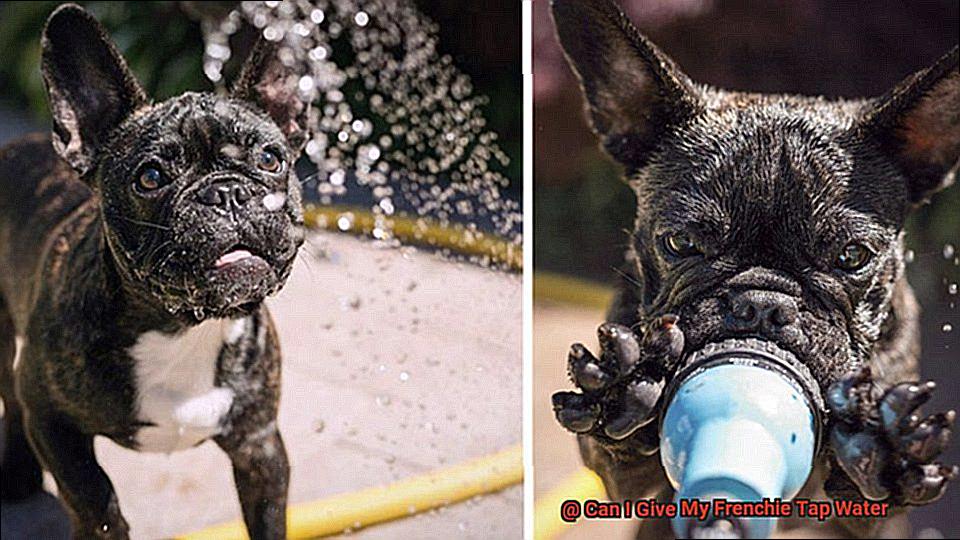
Just like humans, dogs need clean and safe water to stay hydrated and healthy. In this article, we will explore some tips to improve the quality of tap water for your Frenchie.
The Importance of Clean Tap Water:
Tap water can contain harmful contaminants such as bacteria, viruses, heavy metals, chlorine, and pesticides. These substances can be dangerous if consumed regularly by your Frenchie. Therefore, it is crucial to take steps to ensure that their drinking water is clean and safe.
Use a Water Filter:
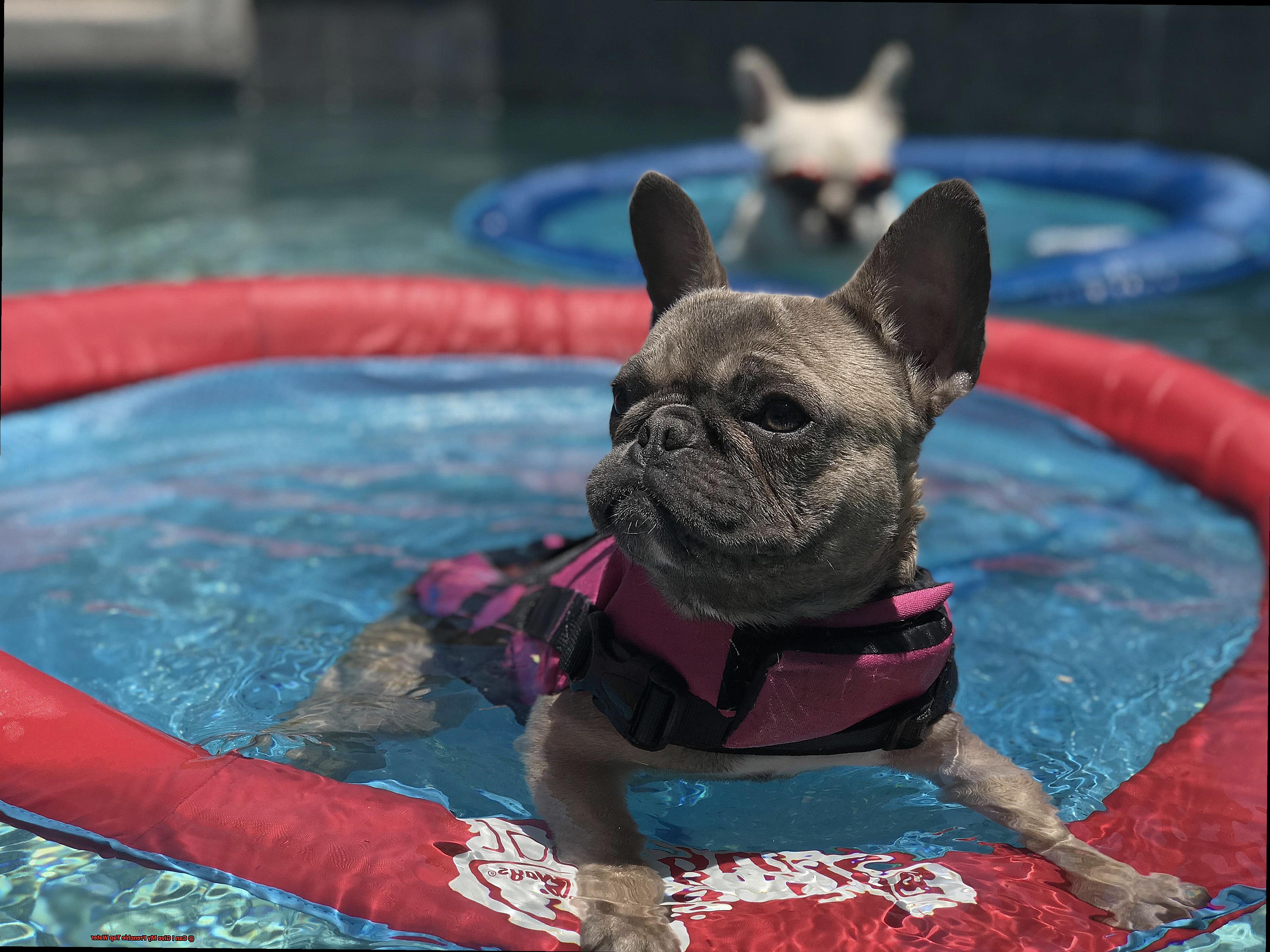
Investing in a good-quality water filter is an excellent way to improve tap water quality. Filters like activated carbon filters, reverse osmosis filters, or ultraviolet filters can remove impurities and chemicals from the water, making it safer for your Frenchie to drink.
Boil the Water:
Boiling tap water is a simple and effective method to kill bacteria and other microorganisms. Remember to let the water cool down before giving it to your Frenchie. While boiling can’t remove certain chemical contaminants, combining it with other methods can help optimize results.
Let the Water Sit:
Allowing tap water to sit for a few hours allows sediments to settle at the bottom of the container. Carefully pour the clear water into another clean container, leaving behind any residue or particles. This method may not eliminate all contaminants but can still improve the overall quality.
Consider Bottled Water:
If you are concerned about tap water quality in your area, using bottled water as an alternative could be a solution. Look for reliable brands that undergo rigorous filtration processes and ensure it’s free from added minerals or chemicals that might harm your Frenchie’s health.
Regularly Clean Water Bowls:
Regardless of the water source, it is essential to clean your Frenchie’s water bowl regularly. Bacterial growth can occur if the bowl is not cleaned and rinsed thoroughly. Wash it with mild soap and warm water at least once a day before refilling it with fresh water.
Consult Your Vet About Tap Water Safety
We all know how important it is to keep our furry friends hydrated, but have you ever wondered about the safety of your tap water for your precious Frenchie? Well, you’re in luck because today we’re talking all about tap water safety and why it’s crucial to consult your vet on this matter. So, let’s dive right in.
Water Quality Woes: Every Location is Different
Just like how every Frenchie has their own unique personality, tap water quality can vary depending on where you live. That’s why it’s wise to consult your veterinarian, who has a finger on the pulse of water quality issues in your area. They can provide specific guidance tailored to your Frenchie’s needs.
Contaminants: The Hidden Culprits
Tap water can sometimes harbor contaminants like heavy metals, chemicals, or bacteria that can spell trouble for our four-legged buddies. These nasties can wreak havoc on their delicate digestive systems, harm their kidneys, or even lead to long-term health complications. Yikes.
Test, Test, Test: Know What’s in Your Water
To be on the safe side, your vet might recommend getting your tap water tested. This helps identify any potential risks lurking in your H2O and allows you to take necessary precautions. After all, prevention is better than cure.
Alternatives to the Rescue
If your tap water isn’t up to snuff, fret not. Your trusted vet may suggest alternative options like filtered or bottled water for your Frenchie. These alternatives can help ensure their hydration while keeping them safe and sound.
Unique Needs and Sensitivities
Just like humans, some Frenchies may have sensitivities or allergies to certain minerals or chemicals present in tap water. Your vet can help pinpoint any specific needs or concerns regarding your Frenchie’s water consumption. They’re the experts, after all.
Watch and Report: Keep an Eye on Your Frenchie
When making any changes to your Frenchie’s drinking water, it’s essential to keep a close eye on their behavior and health. Any unusual symptoms or reactions should be reported to your vet immediately for further evaluation. Better safe than sorry.
Remember, folks, your veterinarian is the ultimate authority when it comes to your Frenchie’s well-being. So, consult them about tap water safety because they’ve got the knowledge and experience to guide you in making informed decisions for your furry friend.
3BT6y-3Q8xY” >
Conclusion
In conclusion, it is perfectly safe to give your Frenchie tap water.
Your furry friend will benefit from the essential minerals present in tap water, promoting good overall health.
